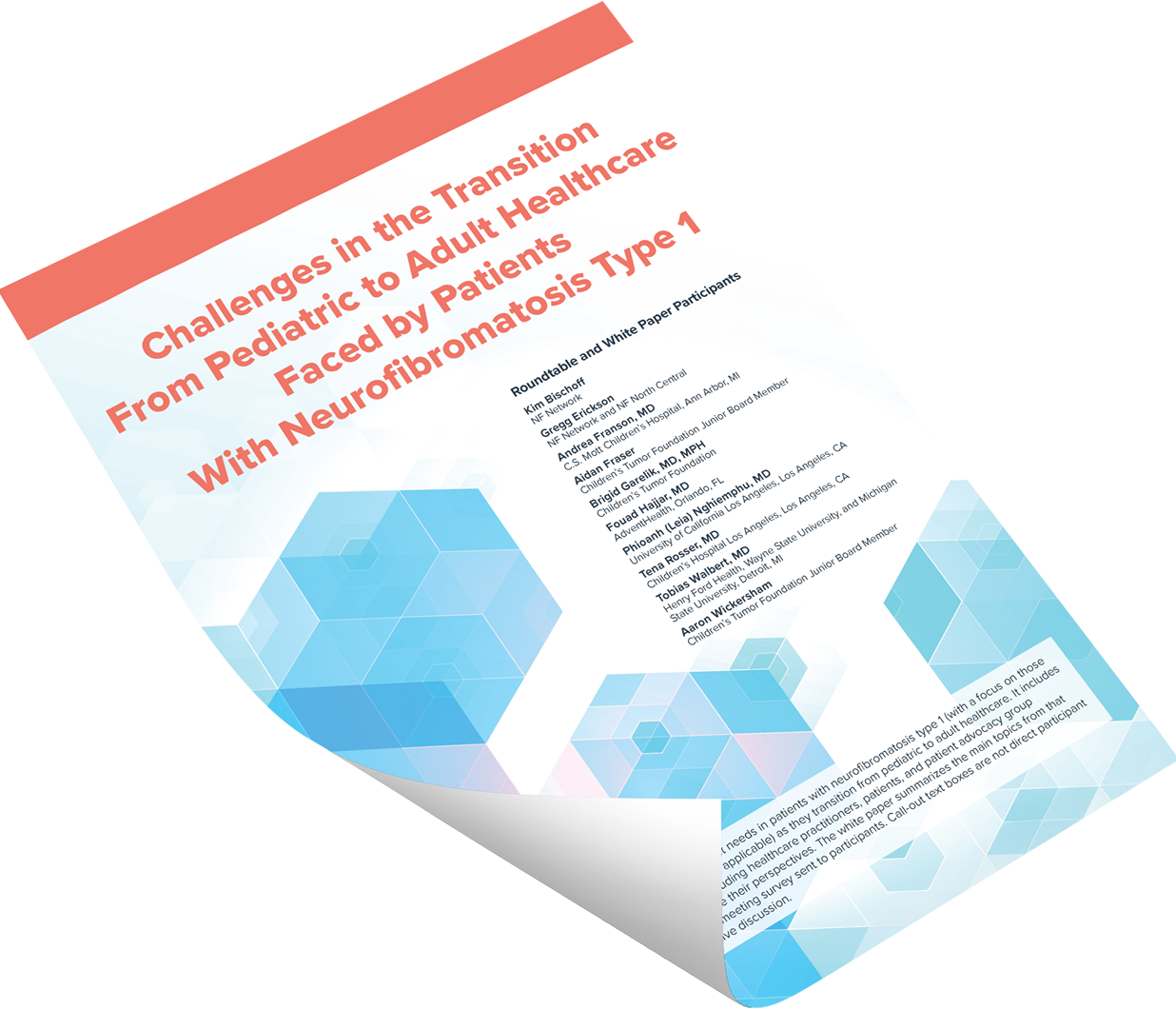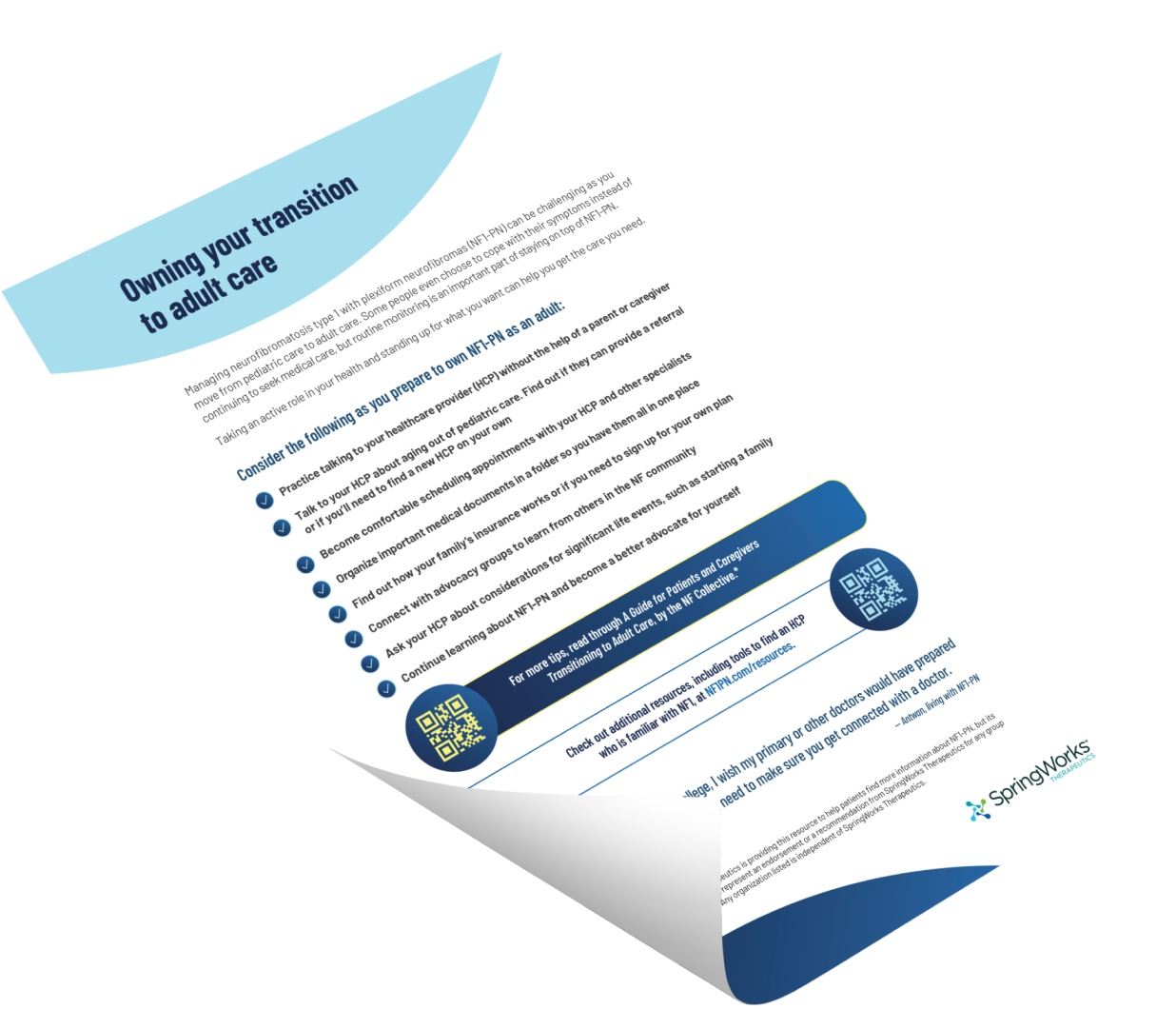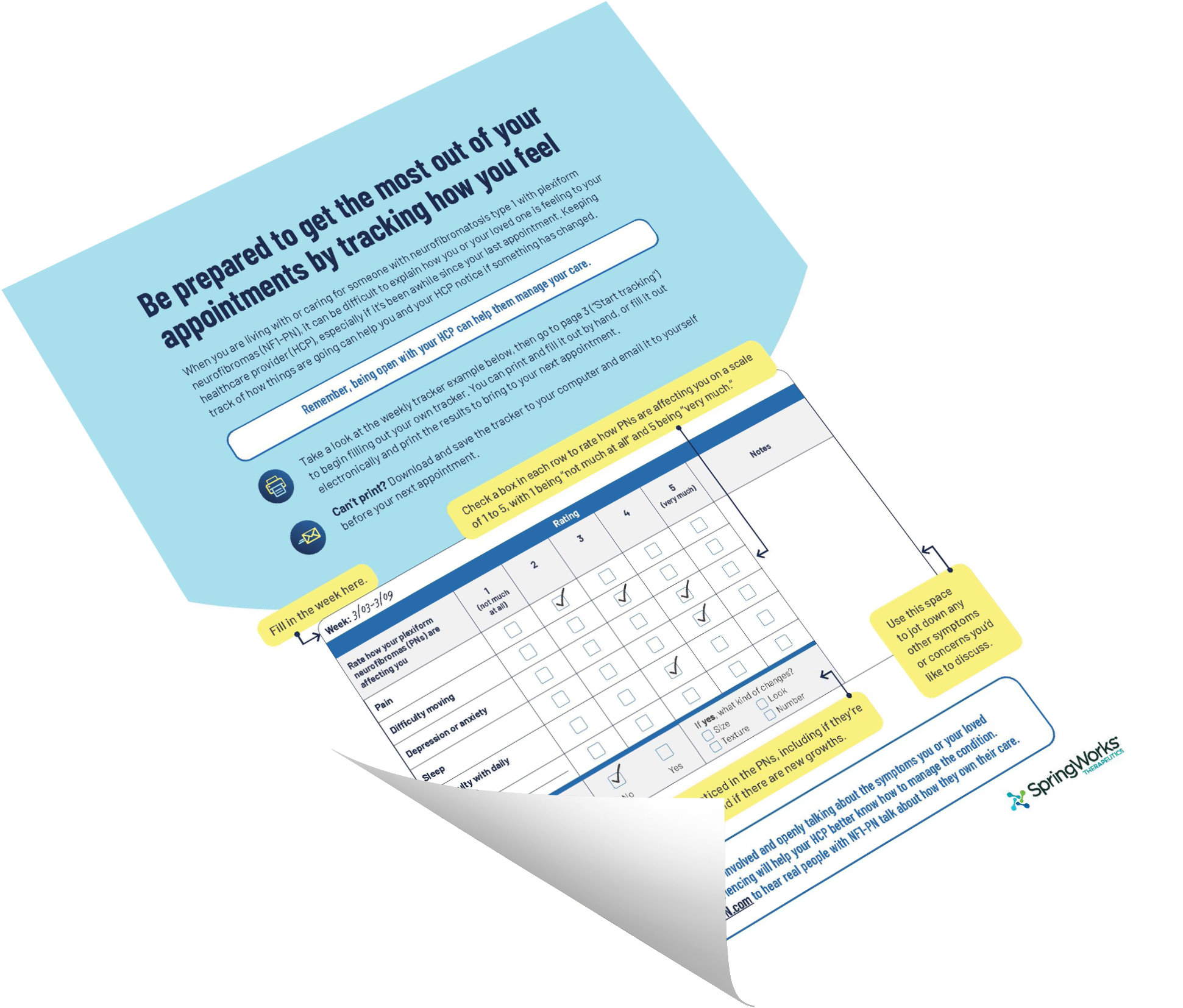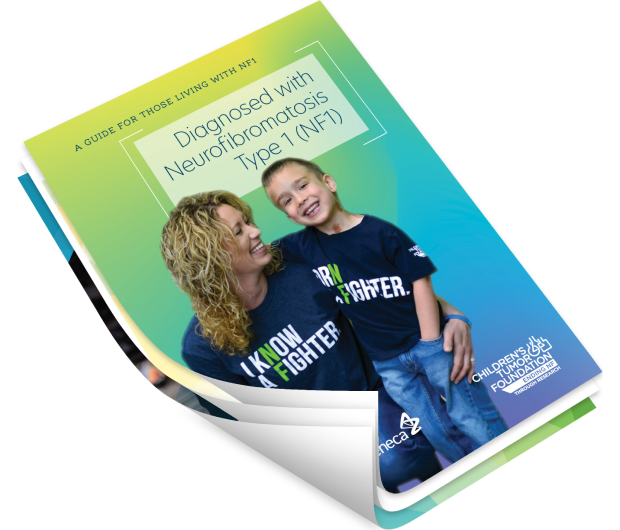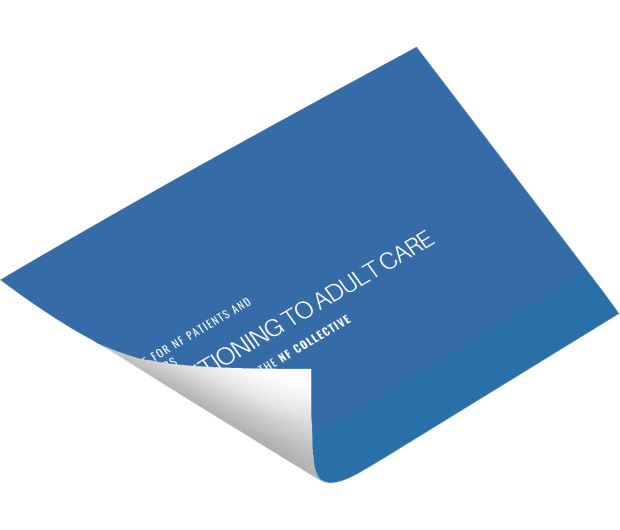This site is intended for US audiences only
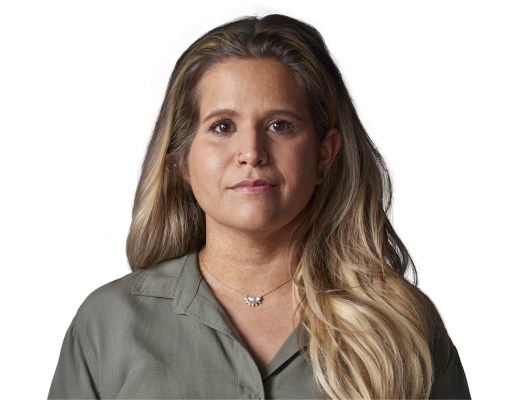
Helpful NF1-PN resources

It helps to have support specifically for my condition.
– Vanessa, living with NF1-PN
Guiding you along the way
The information and resources below have been provided to help you navigate neurofibromatosis type 1 with plexiform neurofibromas (NF1-PN) and its care.
Videos
Meet Krista
She was diagnosed with NF1-PN at 6 months old. Hear her speak about how she has dealt with the condition.
My name is Krista. I’m 39 years old. I live in San Antonio, Texas.
I was diagnosed with NF1-PN when I was 6 months old.
My parents noticed that I had some distinguishing markings all over my body.
I had the café au lait spots all over my body. I had freckling in my groin and in my armpits, and I had the large plexiform on the left side of my neck.
I didn’t always understand why I had to be at the doctor so much. And I really just wanted to be like the other kids my age. And I think I was navigating this unique time in my life where I looked very different.
I had this large, you know, birthmark, and I had even some, like, hair growing on the side of my face from the plexiform neurofibroma.
As I was transitioning into, like, middle school and high school, I really was just trying to fit in.
I got to college and nobody cared anymore. Nobody was making fun of me, and so I kind of at that point just was, like, I can live with this. You know, I’ll be okay.
My outlook with living with NF is that I’ve always tried to have the mindset of focusing on what I can control and just trying to live life to the fullest.
Meet Antwan
He’s been living with NF1-PN for decades. Hear him talk about life with the condition.
My name is Antwan. I’m 38 years old from Kansas City, Missouri.
From what I know, I was two years old when I was diagnosed with NF1. I didn’t realize what NF was really until I became an adult when it really started to give me some challenges.
In 2010, when stuff really hit the fan, it was like, all right, something’s really wrong. Like, I can barely breathe. Like, now I’m like, barely had any energy, and like, I was like, literally on my deathbed.
One doctor encouraged my mom to have me transferred. Another doctor took over and said, hey, we know exactly what to do. And that’s when they realized that a tumor was like, pushing against my lung. So it didn’t leave a lot of room for my lungs to expand, so I wasn’t producing enough oxygen.
But, hey, as long as I can still move around, I’m happy. Like, I don’t get around as easy as the average person, but to me, like, I don’t know what average is because I lived with this my whole life.
I always like to tell people I’m like the sickest healthiest-person you’ll ever meet.
So I’ve had 18 surgeries. I’ve been in the hospital over 25 times, but yet, I’ve traveled. Like, I’ve graduated with a master’s.
No matter what you go through in life, if you have that right attitude, you can, you can really do anything you want.
Planning for a family
Lindsey and Krista discuss the impact NF1-PN has had on their respective family planning journeys.
[Lindsey]
My doctors discussed family planning with me when I was in college.
So, I was maybe 20, 21 years old.
My NF doctor asked me if I was planning on becoming a mother, and when I said I’d someday wanted to be, no time soon, he let me know that it’s most common in people with NF to not only genetic test their embryos to ensure they’re not passing on the genes, but in some cases with NF, it is unsafe for the woman to carry based on different symptoms that she may have.
So, finding that out at a young, vulnerable age when you’re not even, you know, thinking about starting a family, that was a different experience, I think, than a lot of people who struggle with IVF for building their family.
I came into it a whole different way.
[Krista]
In the back of my mind, I always kind of knew I might have to take alternative measures when it came to family planning.
There’s no history of it in my family, but there is a 50/50 chance of passing it on, you know, to my offspring, and although I’ve lived a relatively good life and have been able to manage my symptoms, that might not be the case for, you know, my future child.
It didn’t really become real until I met my husband and, you know, he really wants children.
So, we did the two rounds of IVF last year and, just, that didn’t end up going the way we had hoped.
All of our embryos, you know, tested positive for NF and were affected by the gene.
And so at that point, we decided that adoption was the best route to go.
[Lindsey]
I do not ever stop going to my doctor’s appointments to get monitored, and the reason why I don’t stop is because it’s my health, and I want to continue to be healthy and to be alive and to be around for my family and my friends and hopefully a future family.
Monitoring your condition
See Antwan talk about why it’s important to monitor NF1-PN.
If I was talking to an NF1 patient that didn’t think it was important to see a doctor or to monitor themselves, I would say, don’t be, don’t be naive like I was.
Because if you’re not seeing a doctor on the regular and you’re not monitoring it, what if something does turn to cancer and you’re not seeing a doctor on the regular?
When I got sick in 2013, they found a huge tumor. They even showed me a picture of it. It was crazy. I can’t believe how big it was. That was pushing against the lung, and they found, they found cancer cells in that tumor.
But luckily for me, because they caught it early and because I was seeing the doctor on the regular, they were able just to remove that tumor, and they stopped the cancer. Cancer never was able to grow anywhere.
I get CAT scans on a regular just to make sure no new tumors are popping up. And if a new tumor do pop up, they usually biopsy it right away.
So it helps, you know, seeing a doctor on a regular basis.
If you can stay on top of it, a lot of times when something new pops up, they can catch it before it gets out of control.
Doctors make the difference
Krista explains the importance of staying connected with your doctors.
I’m lucky that my childhood doctor still sees adult patients with NF, which is sometimes rare because as you become an adult, sometimes it’s harder to find neurologists or specialists who will see you because you’re an adult patient and no longer a pediatric patient.
He really, you know, wants the best for his patients, and he knows that his adult patients sometimes don’t have the same resources that his pediatric patients have.
He’s up to date on, you know, the different research being done, and he’s willing to connect me to those resources if it’s a good fit.
I’ve had friends who don’t always go to the doctor to manage their care.
You know, I always try to tell them that you have to be your own advocate, and it’s important to manage this condition.
It’s also just important to stay connected to your doctor.
And if they can’t help you, don’t hesitate to seek out a second opinion.
Just because one person says they can’t help doesn’t mean somebody else can’t.
I’m lucky to have a great team of specialists who really care about me as the patient. That makes me feel really good because they take you serious.
Owning your care
See Antwan talk about how he stays motivated even on tough days.
As far as what does owning your own care mean to me is one, knowing your body, knowing when something’s wrong, knowing when something’s off, and being able to communicate that to your doctors.
Like definitely when you live life with, with NF, you never know when something debilitating can happen to your body.
Really knowing when something’s off and having the discipline to contact your doctor and let them know.
And not like just thinking, like, well, I’m being a baby. It’s not that big of a deal.
Even if it’s small, it can turn into a big deal.
So when a doctor appointment is scheduled, you know, go to it.
Even if you think nothing’s wrong with you, you know, make sure you go to your follow up appointments.
I just love life too much not to take care of me. Cause you are your best asset. You are your best asset. Nobody can take better care of yourself than you.
NF1-PN as an adult: Taking charge of care
Lindsey describes how she adjusted to managing NF1-PN as an adult.
I did not seek NF-specific care until I had to, which was when I was 17.
Building my NF care team was mostly through my mom.
Once I was in college, I would say my mom was still the one booking the appointments, and I was still on my parents’ insurance, but then, you know, once you turn, what is it? 26, that’s when you do go out on your own, and I think that transition is definitely a scary one, into being the one to take your health into your own hands rather than relying on, you know, your caregivers or your parents.
Owning your care is being an advocate for yourself.
It’s ensuring that you have all the proper resources at your fingertips to be able to access the care that you need at any time.
Luckily, I think nowadays there’s great technology that makes it easy for you to make appointments.
There’s apps, you know, that make it really easy to be able to log on to your patient portal and get it booked.
Making sure my doctors hear me and understand my symptoms is very important to me.
I do not ever stop going to my doctor’s appointments to get monitored, and the reason why I don’t stop is because it’s my health, and I want to continue to be healthy and to be alive.
Setting yourself up to make it as easy as possible to care for yourself is what’s most important.
Turning 18: What I wish I knew
Antwan shares his experience transitioning to adult care.
Before I left for college, I remember seeing my pediatrician.
He just kind of, like, checked me out and just, you know, just told me to take care of myself, and he said, “If you need me before you turn 18, you can always come back.”
But as far as, like, connecting me with any, like, doctors, he honestly really didn’t do much.
That transition of care was really, I guess I just wasn’t educated enough to know what I actually needed to do.
I knew if you get sick, you go to the doctor, but I wasn’t really educated on, like, okay, because you have these health challenges growing up, you need to get connected with another doctor when you get, you know, settled.
I just thought, you know, no big deal. I’m going away to school. Like, you know, I’m fine for the most part. But when I got sick in 2010, that’s when I really got connected with, like, a primary doctor. And I started seeing the primary, and then I had to see a pulmonologist, and then I saw my oncologist.
And they started, kind of, took over everything, and, like, since 2010 I’ve been seeing doctors on the regular.
But I just wish they would have, like, had that conversation. You know, encouraged me to connect with a doctor versus waiting until I got sick to connect.
Like, hey, you, you need to be serious. Take your medical care seriously. Or, like, made a referral or something.
But no one ever, like, they never, like, prepared me for that, that transition.
Living with NF1-PN as an adult
Krista explains how she has stayed proactive in managing her care since becoming an adult.
NF has presented some challenges, especially as I’ve gotten older, where I’ve had, you know, more limited mobility with, you know, turning my head from left to right.
I’ve had more stiffness, and I just haven’t been as comfortable. It’s affected my sleep and just general mobility.
When I’m having these symptoms and I’m not comfortable, I bring it up to my doctor because medical care is ever changing and it’s always advancing.
I see quite a few doctors to manage my condition. I see a dermatologist, a neurologist, a neuro-ophthalmologist, an actual ophthalmologist, and then I’m followed up by my PCP.
When I was in college, I had this period of time where my skin on the back of my neck where I have my plexiform neurofibroma, the skin kept breaking down.
The campus doctor, he was like, “Why didn’t you come in last week?” And I said, “Honestly, I just thought it was, like, an abrasion.”
I know much better now that, like, anytime any of my neurofibromas are changing in color or texture, that it’s something I need to pay attention to.
I’d rather go to the doctor more so, and I’m doing what I can to control how I manage my care living with NF.
I feel like I don’t want this to be something that I let prevent me from having a good quality of life.
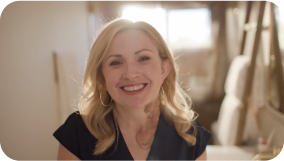
Meet Krista
She was diagnosed with NF1-PN at 6…
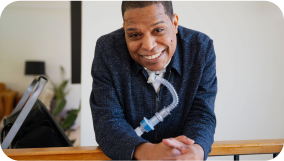
Meet Antwan
He’s been living with NF1-PN for decades…
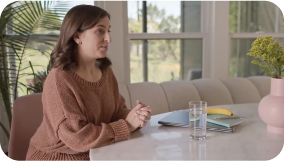
Planning for a family
Lindsey and Krista discuss the impact…
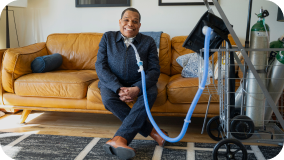
Monitoring your condition
See Antwan talk about why it’s important to…
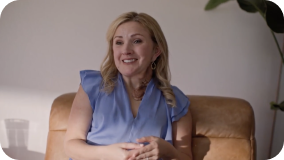
Doctors make the difference
Krista explains…
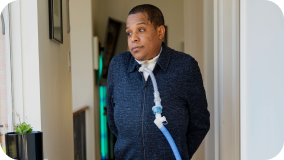
Owning your care
See Antwan talk about how he stays…
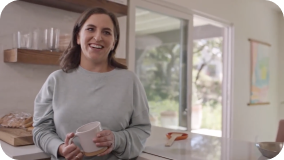
NF1-PN as an adult: Taking charge of care
Lindsey describes…
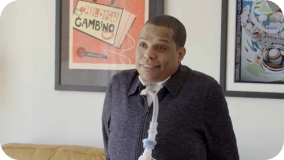
Turning 18: What I wish I knew
Antwan shares…
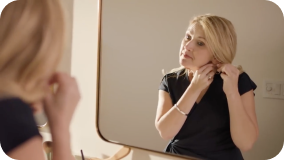
Living with NF1-PN as an adult
Krista explains how…
Downloadable resources
A discussion about the transition of care
A report about the challenges of transitioning from pediatric to adult care for people with NF1, with a focus on potential solutions.
Transition-to-adult-care checklist
NF1-PN discussion guide
Helpful guides from the Children's Tumor Foundation*
Helpful guides from the NF Network*
A Guide for NF Patients and Caregivers Transitioning to Adult Care*
Help finding an NF1 doctor†
If you’re having trouble finding a doctor who is familiar with NF1, these websites feature tools that can help you locate doctors throughout the US.
NF organizations*
If you’re living with or caring for someone with NF1-PN, there are a number of organizations where you can get information or connect with others in the NF community.
*SpringWorks Therapeutics is providing these websites and resources to help patients find more information about NF1-PN, but their inclusion does not represent an endorsement or a recommendation from SpringWorks Therapeutics for any group or organization. Any organization listed is independent of SpringWorks Therapeutics.
†SpringWorks Therapeutics is providing these independent resources to help patients find an NF1 treater by region, but SpringWorks Therapeutics had no role in their development. Their inclusion on this website does not represent an endorsement or a recommendation from SpringWorks Therapeutics for any center or physician.
